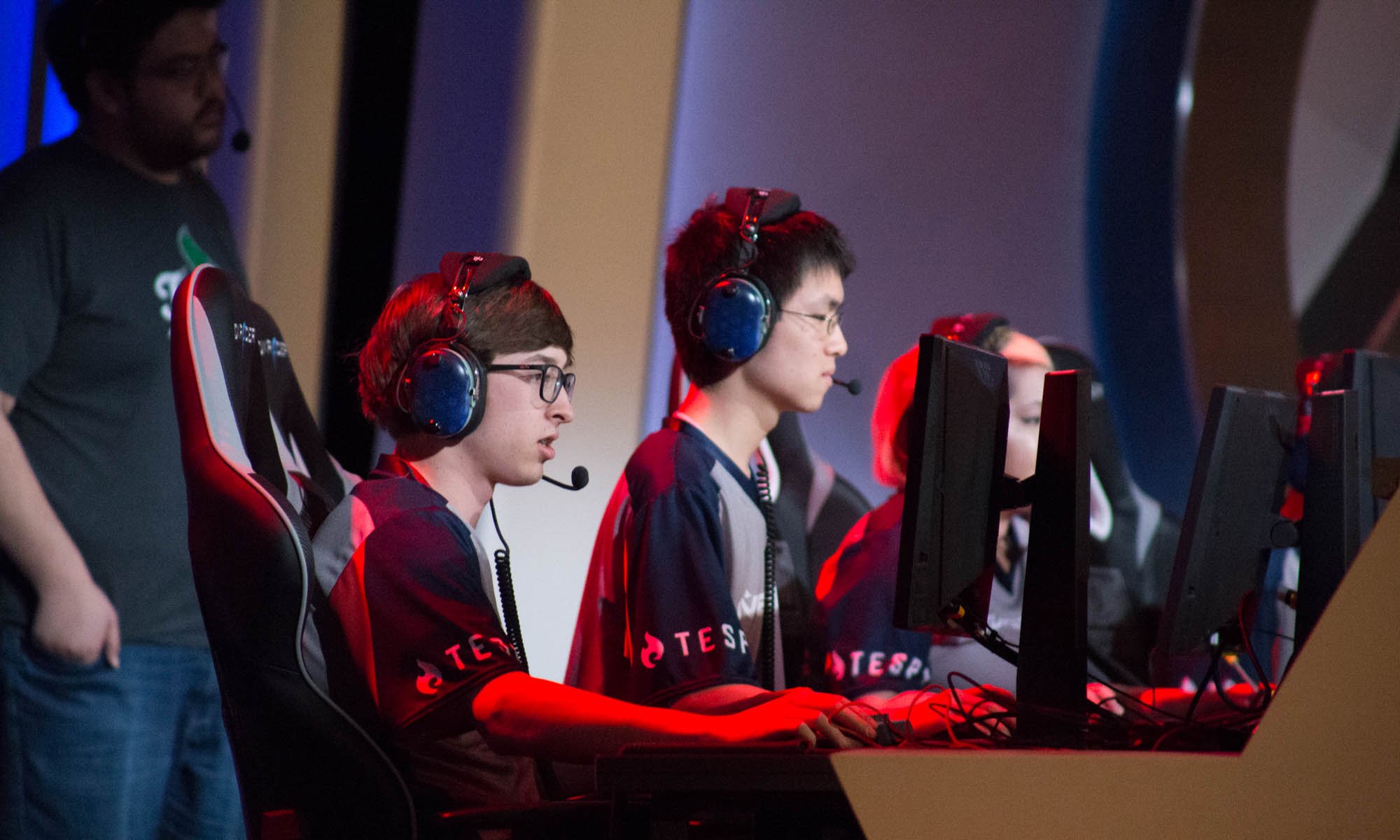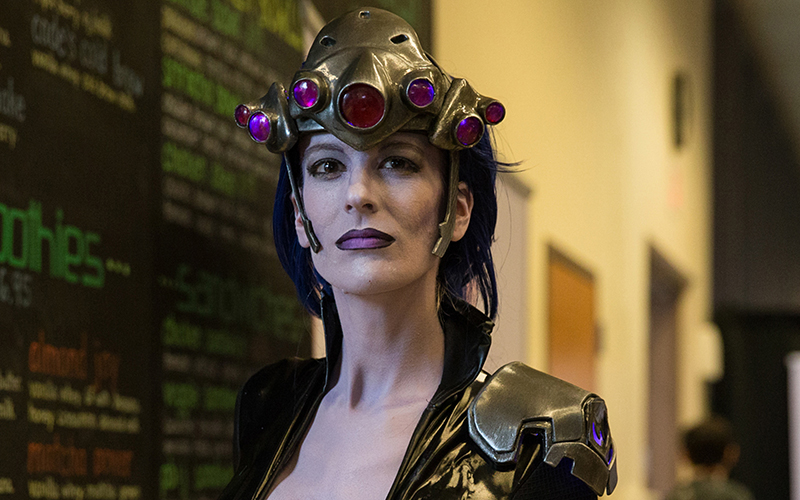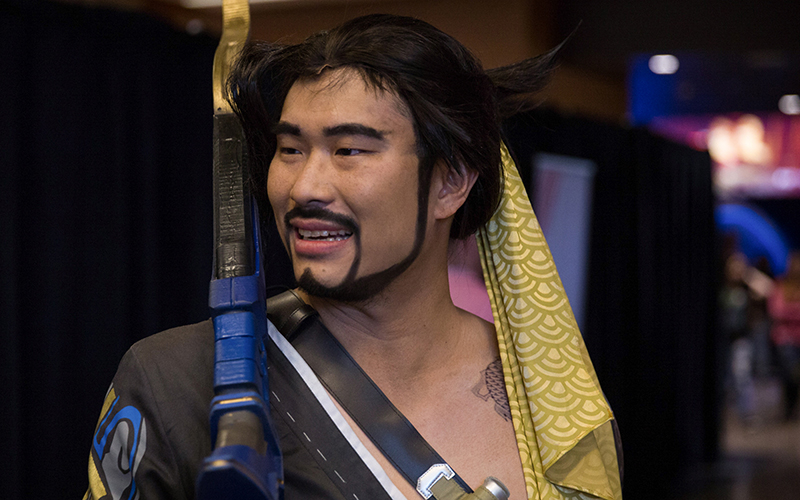
No sweat in esports, but plenty of mental rigor, cosplay fans and money
By Tristan Ettleman/ Cronkite News |
TEMPE – A gorilla with a laser gun draws a bead on a cybernetic archer with metal limbs.
A black-clad assassin aims her sniper rifle at the Grim Reaper, who’s armed with two shotguns.
Surrounded by fans and cosplayers, with thousands watching on their phones, laptops and desktops, four teams of esports competitors battled in February for video game supremacy from their screens on an Arizona State University stage.
Rome had its gladiators, the NFL has its quarterbacks, and the video game industry has esports players. This is sports in the tech universe, with a Fiesta Bowl Overwatch championship drawing more than 600 screaming fans on campus and an estimated 4,000 people watching online.
And that’s just college-level esports. One professional championship last year – named with sports-like hyperbole the League of Legends World Championship – claimed more than 60 million viewers, more than double the viewership for the championship game of the 2017 NBA Finals, according to “Variety.”
The controversy: Sport or not?
Esports has fans, merchandise and money, and, like any other sport, controversy. But if someone doesn’t get sweaty or run on a field or a court, some critics question whether it’s really a sport.
In 2015, Colin Cowherd, a Fox Sports radio host, attacked esports after his former employer, ESPN, started to televise esports competitions.
“I am not a friend of esports,” he said during one broadcast, calling players overweight and unathletic nerds.
Nick Theodorakis, a player for University of California-Irvine in last month’s competition at ASU, said the debate over esports’ place on major sports networks doesn’t take into account the “really mental” focus it requires.
Hundreds of hours of training are required to learn strategies at a competitive level, he said, and the training regimen and competitions’ structure resemble other sports broadcast on sports networks.
Shawnette Gauer, the mother of UC-Irvine esports coach Jacob Bishop, said esports ultimately will move from tech-world niche to mainstream crowds.
Her husband, Steve Gauer, a former college basketball player, said whether people call it a sport doesn’t matter. It’s popular and gaining attention.
“People are always going to make a big deal of the semantics,” he said.
The action: A spectacle to experience
The esports competition on the ASU campus shared the vibe of a WNBA game or a tennis match, seasoned with costumed fans and presented with the production design of “The Voice.”
Two six-person teams hunkered behind a metallic array of outward-facing thrones, their bodies and screens obscured as they played Overwatch, a gunner video game, on a stage raised a few feet above the crowd. The game’s logo was emblazoned in the center of a sleek, metallic gray background.
Seated at their computers, players furrowed their brows and clicked furiously while the action played out on two screens flanking the stage.
Commentators discussed the action as it played out on Twitch, a live streaming website.
“This is some very aggressive play to make sure that the payload can keep pushing past that ‘S’ loop in the second point,” Alberto Rengifo said as University of California-San Diego advanced on UC-Irvine.
Clothing and character figurines were for sale, and fans made signs to support their teams at vending booths in the lobby.
Dozens of cosplayers, dressed as their favorite characters from Overwatch, drew attention and adulation as they walked through a corridor.
Enlin Xu, adorned in tattoos, flowing robes and a bow and arrow as Hanzo from the game, traveled from Tucson with his friend, Sara Spellman. She was dressed as a “gender-bent” Roadhog, playing the male character as a woman.
Fans mobbed the two, shooting selfies.
The money: It’s a lot and growing
Esports is growing in economic clout, with video game companies sponsoring tournaments with winnings that can reach $20 million. The competition helps fuel the $30 billion video-game industry in the U.S., where a game such as Grand Theft Auto V can bring in more money than a Star Wars movie.
Customers can also buy T-shirts, hoodies and action figures online and in retail stores like Hot Topic. Players wear custom jerseys and branded accessories sponsored by other businesses and game developers.
Analyst group Newzoo estimates the esports sliver of the gaming industry of competitions, games and merchandise was worth nearly $700 million globally last year, and it will grow to $1.5 billion by 2020.
Owners of traditional sports teams are gravitating toward esports ownership.
Mark Cuban, who owns the NBA Dallas Mavericks, owns an esports team, as does former NBA player Rick Fox.
Blizzard Entertainment, the developer of World of Warcraft and Overwatch, created its own esports league: the Overwatch League. The OWL has 12 regional teams that play through a five-month regular season, playoffs and league championship. And, just as the Arizona Cardinals’ promote star receiver Larry Fitzgerald, the league markets players with such names as Numlocked as superstars to watch.
Players receive a minimum $50,000 annual salary and get health benefits and housing support. Top players share multimillion dollar winnings.
The champions: Who triumphed
College games can be fun, intense and even lucrative, some players say, but the professional level requires a commitment that’s too extreme for many.
By the time the Fiesta Bowl Overwatch Collegiate National Championship ended, the six players from the University of California-Berkeley snagged the $120,000 in scholarships prizes, beating three other universities from California and Canada.
UC-Berkeley player Gandira Prahandika said the time commitment for professional play “is just not for everyone,” including him. The training and touring schedule makes professional video gaming a full-time job.
But UC-Berkley’s Izzy Barrera said esports, on the college and professional levels, is soaring.
Soon, advocates say it may become as common as other amateur and professional sports.
“It feels like the beginning of something really great,” Shawnette Gauer said.
Have a story idea? Email us at cronkitenews@asu.edu.




Leave a Comment
[fbcomments]